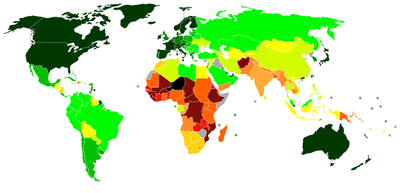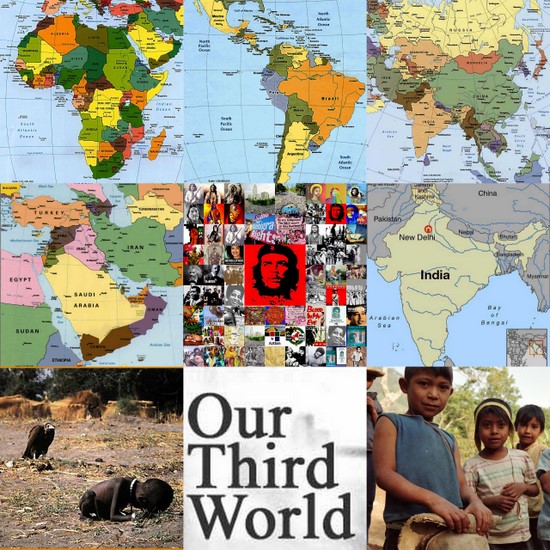Third World ~From Wikipedia, the free encyclopedia
For other uses, see Third World (disambiguation).
Not to be confused with Developing country.

The three worlds as they were separated during the Cold War era, each with its respective allies. Colors do not represent current economical development. First World: the United States and its allies. Second World: the Soviet Union, China and theirs allies. Third World: Non-aligned and neutral countries.
See also: Three Worlds Theory
The term "Third World" arose during the Cold War to define countries that remained non-aligned or not moving at all with either capitalism and NATO (which along with its allies represented the First World) or communism and the Soviet Union (which along with its allies represented the Second World). This definition provided a way of broadly categorizing the nations of the Earth into three groups based on social, political, and economic divisions.
The term continues to be used colloquially to describe the poorest countries in the world.
Contents |
Etymology
The economically underdeveloped countries particularly in the Middle East, South Asia, Latin America, Africa, and Oceania, considered as an entity with common characteristics, such as poverty, high birthrates, and economic dependence on the advanced countries. French demographer, anthropologist and historian Alfred Sauvy, in an article published in the French magazine L'Observateur, August 14, 1952, coined the term Third World, referring to countries that were unaligned with either the Communist Soviet bloc or the Capitalist NATO bloc during the Cold War. His usage was a reference to the Third Estate, the commoners of France who, before and during the French Revolution, opposed priests and nobles, who composed the First Estate and Second Estate, respectively. Sauvy wrote, "Like the third estate, the Third World is nothing, and wants to be something," He conveyed the concept of political non-alignment with either the capitalist or communist bloc.Third World countries are those, such as the above mentioned that are economically underdeveloped. They are considered as an entity with common characteristics, such as poverty, high birthrates, and economic dependence on the advanced countries. The French demographer Alfred Sauvy coined the expression ("tiers monde" in French) in 1952 by analogy with the "third estate," the commoners of France before and during the French Revolution-as opposed to priests and nobles, comprising the first and second estates respectively. Like the third estate, wrote Sauvy, the third world is nothing, and it "wants to be something." The term therefore implies that the third world is exploited, much as the third estate was exploited, and that, like the third estate its destiny is a revolutionary one. It conveys as well a second idea, also discussed by Sauvy, that of non-alignment, for the third world belongs neither to the industrialized capitalist world nor to the industrialized Communist bloc. The expression third world was used at the 1955 conference of Afro-Asian countries held in Bandung, Indonesia. In 1956 a group of social scientists associated with Sauvy's National Institute of Demographic Studies, in Paris, published a book called Le Tiers-Monde. Three years later, the French economist Francois Perroux launched a new journal, on problems of underdevelopment, with the same title. By the end of the 1950's the term was frequently employed in the French media to refer to the underdeveloped countries of Asia, Africa, Oceania, and Latin America.
The growing use of the term Developing World led to a growing sense of solidarity among the nations of the so-called Third World to unite against interference from either major bloc. In 1955, leaders of 29 countries from Asia and Africa met at the Bandung Conference to discuss cooperation. The First Prime Minister of India, Jawaharlal Nehru, notably said:
I have no doubt that an equally able disposition could be made on the part of the other bloc. I belong to neither [the First or Second World] and I propose to belong to neither whatever happens in the world. If we have to stand alone, we will stand by ourselves, whatever happens... We do not agree with the communist teachings, we do not agree with the anti-communist teachings, because they are both based on wrong principles."[1]Nehru's speech led several delegates to call for India to lead a "third bloc" composed of the nations of Africa and Asia, however he declined and no other state chose to fill the proposed role.[2]
In addition, Mao Zedong, the Chairman of China Communist Party, on February 22, 1974 with the President of the Republic of Zambia Kenneth Kaunda had said: "I think the United States and the Soviet Union was the first world. Centrist, Japan, Europe, Australia, Canada, is the Second World. We are the Third World." This definition, basically according to human development index, with the first popular—Cold War framework focusing on the difference between patterns that subconsciously—take a completely different point of view.

World map indicating a Human Development Index (2009 Update)
| Developed 0.950 and Over 0.900–0.949 0.850–0.899 0.800–0.849 | Developing 0.750–0.799 0.700–0.749 0.650–0.699 0.600–0.649 0.550–0.599 0.500–0.549 | Under-developed 0.450–0.499 0.400–0.449 0.350–0.399 under 0.350 not available |
History
| This section does not cite any references or sources. Please help improve this article by adding citations to reliable sources. Unsourced material may be challenged and removed. (May 2010) |
A number of Third World countries were former colonies and with the end of imperialism many of these countries, especially the smaller ones, were faced with the challenges of nation and institution-building on their own for the first time. Due to this common background many of these nations were for most of the 20th century, and are still today, "developing" in economic terms. This term when used today generally denotes countries that have not "developed" to the same levels as OECD countries, and which are thus in the process of "developing". In the 1980s, economist Peter Bauer offered a competing definition for the term Third World. He claimed that the attachment of Third World status to a particular country was not based on any stable economic or political criteria, and was a mostly arbitrary process. The large diversity of countries that were considered to be part of the Third World, from Indonesia to Afghanistan, ranged widely from economically primitive to economically advanced and from politically non-aligned to Soviet- or Western-leaning[3].
An argument could also be made for how parts of the U.S. are more like the Third World.[4] The only characteristic that Bauer found common in all Third World countries was that their governments "demand and receive Western aid" (the giving of which he strongly opposed). Thus, the aggregate term "Third World" was challenged as misleading even during the Cold War period.
See also
Notes
- ^ Modern History Sourcebook: Prime Minister Nehru: Speech to Bandung Conference Political Committee, 1955. Quoted from G. M. Kahin, The Asian-African Conference (Cornell University Press, 1956), pp. 64–72.
- ^ Thomas, Darryl C. The Theory and Practice of Third World Solidarity. Westport, Conn.: Praeger Publishers, 2001. ISBN 0275928438. Page 72.
- ^ For example, Dr. Sergey Zagraevsky considers that Russia is moving to Third World [1], [2]
- ^ http://www2.macleans.ca/2010/09/14/third-world-america/ MacLeans - Third World America - September 14, 2010
Further reading
- Aijaz Ahmad, In Theory: Classes, Nations, Literatures. (1992)
- P. T. Bauer, Equality, the Third World, and Economic Delusion. (1981) ISBN 0-674-25986-6.
- J. Cole, Development and Underdevelopment. (1987)
- A. Escobar, Encountering Development. The Making and Unmaking of the Third World. (1995)
- E. Hermassi, The Third World Reassessed. (1980)
- A. R. Kasdan, The Third World: A New Focus for Development. (1973)
- P. W. Porter and E. S. Sheppard, A World of Difference: Society, Nature, and Development. (1998)
- H. A. Reitsma and J. M. Kleinpenning, The Third World in Perspective. (1985)
- Alan Whaites, States in Development, UK Department for International Development. London (2007), *
- A. Huffington, Third World America: How Our Politicians Are Abandoning the Middle Class and Betraying the American Dream. (2010)*
- P. J. Buchanan, State of Emergency: The Third World Invasion and Conquest of America. (2006)*
http://en.wikipedia.org/wiki/Third_World
+++++++++++++++++++++++++
3rd-World-News Blog ~
http://third-world-news.blogspot.com
+++++++++++++++++++++++++



No comments:
Post a Comment